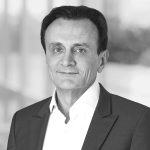Pascal Soriot
A Chief Executive Officer’s perspective
 Inclusion and diversity is fundamental to our success as an organisation. As a global, science-led, patient-focused pharmaceutical company, we are tireless in the pursuit of delivering life-changing medicines to patients, and our team of more than 80,000 people worldwide push the boundaries of science every day. That has never been more apparent than during the COVID-19 pandemic, as we’ve delivered our vaccine and long-acting antibody to patients all over the world.
Inclusion and diversity is fundamental to our success as an organisation. As a global, science-led, patient-focused pharmaceutical company, we are tireless in the pursuit of delivering life-changing medicines to patients, and our team of more than 80,000 people worldwide push the boundaries of science every day. That has never been more apparent than during the COVID-19 pandemic, as we’ve delivered our vaccine and long-acting antibody to patients all over the world.
This kind of ground-breaking work would not be possible without a diverse workforce who feel empowered to challenge the status quo. At AstraZeneca, we therefore place great importance on nurturing an inclusive environment where people feel valued and able to be their authentic selves.
I believe that innovation only occurs when people feel safe to offer alternative perspectives, when those ideas are welcomed and valued, and when challenging conventional thinking is part of everyday life. Creating an inclusive culture and building a diverse workforce is consequently a strategic priority for us and it’s why I chair our Global Inclusion & Diversity Council and oversee the delivery of our commitments.
One such commitment is to gender equality and I’m proud to work alongside a global workforce of which over half are women, and where the number of women in senior roles across our organisation continues to increase. In 2021, women represented 44% of our Leadership team and two more women joined our Senior Executive Team, making five of its twelve members women.
If we are to continue to drive progress, we must review and be transparent about our diversity performance. In this regard, independent bodies such as the FTSE Women Leaders Review are doing invaluable work to advance gender equality across all industries.
I will never be complacent when it comes to our commitment to gender equality as a crucial part of ensuring that AstraZeneca is fully inclusive and diverse. It’s also central to driving the innovation the world needs to make an even bigger difference to the lives of patients and society.
February 2022



